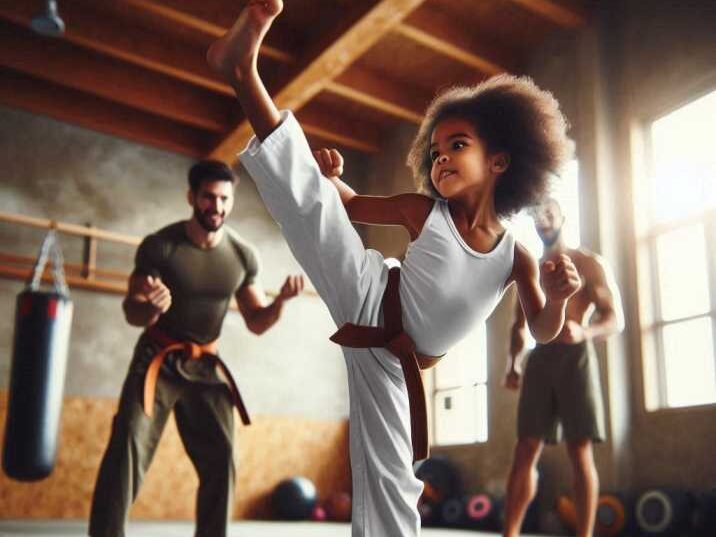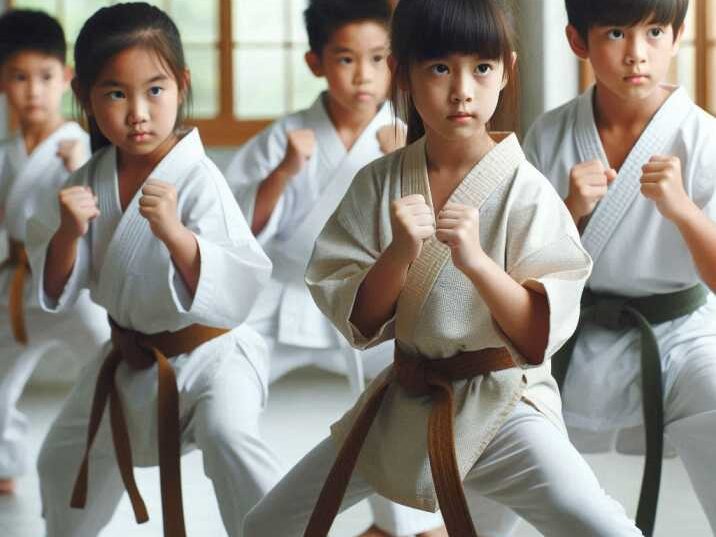Mixed Martial Arts (MMA) training isn’t just for adults; kids can benefit too! This article explores the top benefits of mixed martial arts for kids, covering how MMA training impacts their physical, mental, and social development. MMA isn’t just about learning self-defence; it’s a way for kids to build lifelong skills, boost self-esteem, and stay active.

Introduction
Table of Contents
Mixed Martial Arts (MMA) isn’t just about combat; it’s a sport that offers numerous physical, mental, and emotional benefits for young people. When kids participate in MMA training, they gain skills that are beneficial not only in sports but also in life. As children build discipline, respect, and self-confidence, they become more prepared for challenges in school and daily life. MMA helps children learn to work hard and stay focused, encouraging them to set goals and achieve them. Let’s dive into the top reasons why MMA can be a fantastic choice for kids!
Physical Benefits of Mixed Martial Arts for Kids
1. Boosts Physical Fitness
Mixed martial arts (MMA) training is full of exercises that strengthen a child’s muscles, improve endurance, and enhance flexibility. Through activities like jumping, stretching, and various bodyweight movements, kids work on full-body fitness in a fun, engaging way. This training helps them build stronger muscles and better stamina, allowing them to stay active longer without feeling tired. Additionally, MMA workouts improve cardiovascular health, which is essential for keeping their hearts and lungs healthy. The combination of movements helps kids stay flexible and agile, giving them better coordination and balance.
Improved Cardiovascular Health
A key component of MMA is cardiovascular fitness, which keeps kids’ hearts and lungs strong. Regular training includes high-energy drills that get their heart rate up, improving stamina over time. This kind of cardio workout is great for heart health and helps prevent future issues by keeping kids active and energetic. With improved cardiovascular endurance, children feel more energized throughout the day and are more prepared for other sports or physical activities.
Enhanced Flexibility and Balance
MMA techniques involve movements that improve flexibility, balance, and agility. Kicks stretches, and fluid techniques in MMA help kids become more limber and coordinated. With improved flexibility, they are less prone to injury, as their muscles and joints can handle a greater range of motion. Balance training is also a big part of MMA, helping kids improve their posture and stability, which are useful both in sports and everyday activities.
2. Teaches Self-Defense Skills
Self-defence is one of the most empowering skills taught in MMA. Kids learn to protect themselves using techniques like blocking, striking, and escaping holds, which can be incredibly useful in difficult situations. Learning self-defence helps kids feel safer and more confident in various settings. Knowing they can handle themselves allows kids to develop greater self-assurance, helping them become more assertive and courageous. In addition, the self-control taught alongside self-defence techniques ensures they understand the responsible way to use these skills.
Mental and Emotional Benefits of Mixed Martial Arts for Kids
3. Improves Focus and Discipline
Mixed martial arts (MMA) training emphasizes concentration and discipline, which helps kids develop better focus for school and other activities. During classes, they must listen carefully, follow specific instructions, and remain dedicated to their training goals. This focus on details and practice strengthens their attention span and ability to concentrate. Over time, this enhanced focus can positively impact academic performance, helping kids improve their grades. MMA also teaches kids to be patient and persistent, as they must work hard to master each technique and earn each new belt level.
Improved Academic Performance
The focus and discipline kids develop in MMA directly benefit their schoolwork. Kids who can concentrate better and stay organized in class often find it easier to keep up with assignments and study effectively. This improved focus and motivation can help boost grades and make school a more positive experience. Additionally, disciplined kids tend to set academic goals and work consistently towards achieving them, leading to long-term academic success.
Greater Patience
MMA requires patience and repeated practice, as each move needs refining and improving over time. Kids learn not to expect immediate results and instead focus on steady progress. This helps them understand the importance of patience and persistence, both in martial arts and in daily life. Patience is a valuable skill that helps kids manage frustration and keep trying, even when they face challenges.
4. Builds Self-Confidence
In MMA, kids have opportunities to learn new techniques and advance through different belt levels, which boosts their sense of achievement. Each skill they master adds to their self-esteem, making them feel more confident in their abilities. As they earn belts and gain recognition, they develop a strong sense of self-confidence that carries over into other areas of life, such as school and social situations. This confidence allows them to approach challenges with a positive attitude and a belief in their ability to succeed.
Social Benefits of Mixed Martial Arts for Kids
5. Encourages Teamwork and Respect
MMA training involves partner drills and group activities, teaching kids how to work with others and build trust. They learn to respect their training partners by cooperating, listening, and following shared rules. By practising teamwork and respect, kids develop better social skills that help them make friends and handle group situations both in sports and at school. Respect is a core value in martial arts, and kids carry this value with them into everyday life.

6. Teaches Goal Setting and Achievement
In MMA, kids set goals, such as mastering a new move or earning the next belt rank, which helps them build goal-setting skills. This process involves planning, focus, and effort, allowing kids to experience the reward of reaching their objectives. Learning to set and achieve goals in MMA is valuable in both academic and personal growth, as it teaches them to approach challenges with a clear purpose. Kids who practice goal-setting are often more motivated and organized, preparing them for success in all aspects of life.
Psychological Benefits of Mixed Martial Arts for Kids
7. Develops Mental Resilience
MMA can be physically and mentally demanding, requiring kids to push through challenges and keep trying even when they face setbacks. This helps them develop mental resilience, or the ability to bounce back and stay motivated when things are tough. Learning to handle difficult situations in MMA training makes kids more resilient in other areas of life, such as school or friendships. This resilience helps them manage stress better and gives them the courage to face new or challenging situations.
8. Provides a Healthy Outlet for Stress
Kids today experience pressures from schoolwork, social dynamics, and other activities. MMA training provides a positive way to release stress by allowing kids to engage in physical activity and channel their energy. Punching bags, practising moves, and focusing on training help kids release built-up stress in a controlled and healthy environment. This helps them manage emotions better and promotes mental well-being by reducing anxiety and encouraging a positive outlook.
9. Promotes Fun and Engagement
One of the standout benefits of mixed martial arts (MMA) for kids is how it promotes fun and engagement. Unlike traditional sports that may focus on one type of activity, MMA offers a diverse range of exercises, from punches and kicks to self-defence drills and sparring. This variety keeps training exciting and helps children stay motivated and interested in their fitness journey. The dynamic nature of MMA encourages kids to explore different skills and challenges, making it a compelling way to stay active. Because it’s enjoyable, kids are more likely to return to class, fostering a lifelong love for physical activity.
10. Builds Lifelong Skills
The skills children acquire through MMA training extend well beyond the dojo. They learn valuable life lessons such as discipline, respect, and perseverance, which serve them throughout their lives. These qualities are essential for success in school, helping them to manage time effectively and work well with peers. Additionally, the confidence and self-defence techniques learned in MMA empower children to handle social situations and conflicts more effectively. As they grow, these skills become fundamental in building strong relationships and navigating challenges in future careers, making MMA an investment in their long-term personal development.
Table of Information
| Benefit | Description |
|---|---|
| Physical Fitness | Builds strength, endurance, and flexibility |
| Self-Defense Skills | Teaches effective self-defense techniques |
| Discipline & Focus | Enhances focus and self-control |
| Social Skills | Encourages teamwork and respect |
| Self-Confidence | Boosts self-esteem and self-awareness |
| Mental Resilience | Fosters grit and perseverance |
| Stress Relief | Provides a healthy outlet for stress and emotions |
| Goal Setting | Teaches the importance of setting and achieving goals |
| Fun & Engagement | Keeps kids motivated and interested in staying active |
| Lifelong Skills | Builds a foundation for future success in all areas of life |
Conclusion
Mixed martial arts provides children with a wide array of benefits, from improved physical fitness to enhanced mental focus and social skills. MMA is much more than just learning to fight—it’s about self-discipline, respect, and resilience. When kids start MMA training, they gain valuable skills that positively impact every aspect of their lives, preparing them to face challenges confidently and with a positive attitude.
FAQs
1. At what age can kids start mixed martial arts?
Kids can typically start MMA training as young as 5-6 years old, depending on the school’s policies and the child’s maturity level.
2. Is mixed martial arts safe for children?
Yes, MMA classes for kids are generally designed to be safe, with proper protective gear and instruction from experienced trainers.
3. Does MMA make kids aggressive?
No, MMA teaches kids discipline, respect, and self-control, which can reduce aggressive behaviours.
4. How often should kids train in MMA?
Kids typically train 1-3 times per week, depending on their interests and schedule.
5. Do kids need any prior experience to start MMA?
No, beginners are welcome! Most MMA classes for kids start with the basics and build up from there.


